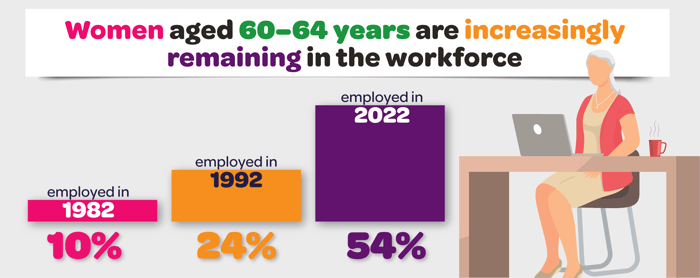
The turn of the 21st century has brought significant change, particularly for women. It's remarkable to think that just 100 years ago, women were not permitted to work outside the home, own property, vote, or even have legal rights over their children. Husbands often held complete control over their wives. However, the early 20th century saw women fighting fiercely for their rights, leading to monumental societal shifts.
As women gained more freedom, many entered the workforce, often taking office and clerical roles. Over time, the landscape continued to evolve, with more women stepping into technical and trade professions. Since May 2022, the number of women in the workforce has been on the rise. HRM Asia reports that over three million women now enjoy full-time employment in Australia.
According to the Australian Government’s 2024 Status of Women Report Card, 60.4% of women aged 15 and older are employed. Interestingly, women between the ages of 15 and 64 work an average of 55.4 hours per week—paid and unpaid—two hours more than men.

Image Credit:
How Does Mentorship Help Women in the Workplace?
Given these statistics, it’s impressive to see how far women have come in recent years. To further support their growth, one of the most impactful initiatives organisations can implement is mentorship programs. Despite the many benefits mentoring offers, 63% of women have never had a formal mentor.
Mentoring is more essential than ever, offering women guidance in key areas such as:
1. Career Advancement
- Career Path Guidance: Mentors help women set career goals, explore various opportunities, and make informed decisions about their professional future.
- Opportunities for Promotion: Mentors advocate for their mentees, helping them gain visibility and access to promotions or new roles.
- Skill Development: Mentors assist in building essential skills for career growth, including leadership, communication, and negotiation.
2. Confidence and Empowerment
- Self-Esteem Building: Mentors provide constructive feedback and encouragement, helping women boost their confidence.
- Challenging Gender Biases: Mentorship helps women navigate and overcome gender biases, empowering them to assert themselves in male-dominated environments.
3. Networking and Visibility
- Expanding Networks: Mentors introduce their mentees to influential contacts, expanding their professional network.
- Increased Visibility: Mentors help women gain recognition within their organisation and industry, enhancing their visibility.
4. Navigating Work-Life Balance
- Work-Life Integration: Mentors, particularly those who have successfully managed work-life balance, offer advice on integrating personal and professional life.
- Support During Transitions: Mentors guide women through life transitions, such as returning to work after maternity leave or managing family responsibilities alongside a career.
5. Role Modelling
- Representation: Female mentors serve as relatable role models, demonstrating that success is achievable.
- Inspiration: Seeing women in leadership positions inspires mentees to aim for leadership roles themselves.
6. Resilience and Coping Strategies
- Overcoming Challenges: Mentors share personal experiences of overcoming obstacles, helping women develop resilience and learn coping strategies.
- Mental and Emotional Support: Mentors provide a safe space to discuss workplace issues, offering emotional support and practical advice.
7. Long-Term Career Planning
- Strategic Thinking: Mentors encourage women to think long-term about their careers, helping them plan for future goals and challenges.
- Succession Planning: Mentorship plays a role in preparing women for leadership positions, ensuring they’re ready to take on more responsibility.
Overall, mentorship is a powerful tool that can help women overcome barriers, achieve their career goals, and thrive in the workplace.
RELATED: Mentoring for Women: Why Women Need It More Than Ever

Groups of Women Who Need Mentoring
Mentorship is particularly beneficial for women from marginalised or underrepresented groups, including single mothers, working moms, women of colour, LGBTQ+ individuals, and women with disabilities. These groups often face unique workplace challenges, and tailored mentoring can provide vital support.
1. Single Mothers
- Work-Life Balance: Mentors offer advice on balancing work and parenting, providing practical tips for time management.
- Emotional Support: Single mothers often face stress and isolation. Mentors provide encouragement and support, helping them manage both work and family responsibilities.
- Career Flexibility: Mentors guide single mothers in finding flexible work arrangements that accommodate their parenting needs without hindering career growth.
2. Working Moms
- Navigating Career Breaks: Mentors assist in transitioning back to work after maternity leave, helping rebuild confidence.
- Advocacy for Family-Friendly Policies: Mentors empower working moms to advocate for remote work, flexible hours, and on-site childcare.
- Career Advancement: Mentors help working moms continue their professional development while managing family responsibilities.
3. Women of Colour
- Navigating Racial Bias: Mentors offer guidance on dealing with racial bias and microaggressions, helping women of colour advocate for themselves and find allies.
- Representation and Role Modelling: Mentors from similar backgrounds provide inspiration and representation, showing that success is possible.
- Building Networks: Mentors help women of colour build strong professional networks, opening doors to opportunities.
4. LGBTQ+ Women and Femmes
- Navigating Identity: Mentors advise on how to navigate identity in the workplace and address discrimination.
- Creating Inclusive Spaces: Mentors help advocate for inclusive workplace policies, contributing to a supportive environment for all employees.
- Support and Affirmation: Mentorship provides a safe space for LGBTQ+ individuals to discuss identity-related challenges, offering support and affirmation.
5. Women with Disabilities
- Accessibility and Accommodation: Mentors guide women with disabilities in advocating for necessary accommodations to perform their jobs effectively.
- Career Development: Mentors help women with disabilities identify suitable career paths and strategies to overcome accessibility barriers.
- Building Confidence: Mentors encourage, and help women with disabilities to believe in their potential and pursue their goals.
For women in these groups, mentorship can be life-changing, offering not just career guidance but also a sense of belonging and validation. It helps women navigate challenges, build resilience, and achieve success on their own terms.
The Overall Impact of Mentorship
If you'd like to see how Brancher supports women in the workplace, reach out! Our CEO and co-founder, Holly Brailsford, is a passionate advocate for mental health and mentorship. Learn more about our impact and how we mentor women across various sectors on our website.




